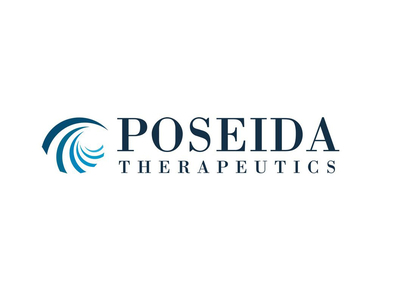Poseida Therapeutics, Inc. (Nasdaq: PSTX), today reported interim results from its Phase 1/2 PRIME clinical trial of P-BCMA-101 for the treatment of relapsed/refractory multiple myeloma (R/R MM) at the 2021 American Society of Hematology (ASH) Annual Meeting.
| SAN DIEGO, Dec. 13, 2021 /PRNewswire/ -- Poseida Therapeutics, Inc. , (Nasdaq: PSTX), a clinical-stage biopharmaceutical company utilizing proprietary genetic engineering platform technologies to create cell and gene therapeutics with the capacity to cure, today reported interim results from its Phase 1/2 PRIME clinical trial of P-BCMA-101 for the treatment of relapsed/refractory multiple myeloma (R/R MM) at the 2021 American Society of Hematology (ASH) Annual Meeting. The results show that P-BCMA-101, a non-viral transposon-based autologous CAR-T, was well tolerated and demonstrated strong anti-tumor activity in advanced, late line R/R MM patients. The learnings from P-BCMA-101 informed the development of the Company’s first allogeneic program, P-BCMA-ALLO1 which is also being evaluated in R/R MM patients. The Company previously announced that it is winding down the P-BCMA-101 autologous program in favor of the allogeneic program, P-BCMA-ALLO1. “We are encouraged by the outcomes seen from our clinical trial of P-BCMA-101, results that continue to validate our approach and that have informed P-BCMA-ALLO1, our first fully allogeneic CAR-T program for patients with multiple myeloma, as well as our other programs. Our focus is on creating differentiated product candidates with a high percentage of T stem cell memory (Tscm) cells,” said Eric Ostertag, M.D., Ph.D., chief executive officer of Poseida Therapeutics. “Looking ahead, we continue to advance P-BCMA-ALLO1 and P-MUC1C-ALLO1 and look forward to presenting data in 2022 for both of these allogeneic programs.” The PRIME trial is a Phase 1/2, open label 3+3 single dose escalation of P-BCMA-101 CAR-T cells. The primary objective of the study is to determine the safety and maximum tolerated dose of P-BCMA-101 based on dose limiting toxicities (DLT), and the key secondary objective is to assess the anti-myeloma effect of the product. The median patient age was 62, with a median time since diagnosis of approximately 5.8 years. Patients were heavily pre-treated, with a median of 7 prior lines of therapy (2-18). As of the data cut-off date of October 15, 2021, a total of 98 patients have been dosed with P-BCMA-101. The best observed treatment regimen was a combination with rituximab (n=14), with an overall response rate (ORR) of 78%, a VGPR/sCR rate of 43% and 100% overall survival at the time of the data cutoff. Progression free survival was also improved with rituximab, with median overall survival rates not yet reached in several cohorts including the rituximab combination cohorts. Response rates for other cohorts are consistent with results previously reported. Across the study, no dose-limiting toxicities were observed. 28% of patients developed cytokine release syndrome (CRS) and 7% of patients developed neurotoxicity. None of the patients developed Grade 3 or higher CRS, and 2% of patients developed Grade 3 neurotoxicity. There were no treatment-related deaths among the patient population and no patients needed ICU admission as a result of CAR-T related toxicities. 28 patients were treated on a fully outpatient basis. “P-BCMA-101 demonstrated strong anti-tumor activity in advanced multiple myeloma patients, and cohorts to date have shown minimal CRS and neurotoxicity, which allows for safe administration in an outpatient environment and combinations with other therapies,” said Caitlin Costello, M.D., Associate Clinical Professor of Medicine and member of the Division of Blood and Marrow Transplantation at the University of California, San Diego. “These data indicate that the piggyBac transposon-based platform is an attractive option for allogeneic CAR-T cells, which has led to a first-in-human Phase 1 study.” The Company’s first fully allogeneic CAR-T cell product, P-BCMA-ALLO1 utilizes Poseida’s proprietary piggyBac® DNA delivery system and Cas-CLOVER™ site-specific gene editing system to create an allogeneic product that prevents both graft-vs-host and host-vs-graft diseases and also incorporates a next-generation BCMA binder. P-BCMA-ALLO1 manufacturing involves a proprietary “booster” molecule that allows for numerous doses to be produced from a single manufacturing run, while maintaining desirable Tscm cells, which can reach percentages in the 60-80% range. The Investigational New Drug (IND) application for P-BCMA-ALLO1 was given a safe to proceed designation by the FDA in August 2021. The Phase 1 study is an open label, dose escalation study following a 3+3 design of dose escalation in subjects with R/R MM. The study will assess the safety and maximum tolerated dose of P-BCMA-ALLO1 based on dose limiting toxicities. Key secondary objectives of the study include the anti-myeloma effect and safety of P-BCMA-ALLO1. About Poseida Therapeutics, Inc. Forward-Looking Statement
SOURCE Poseida Therapeutics, Inc. | ||
Company Codes: NASDAQ-NMS:PSTX |





